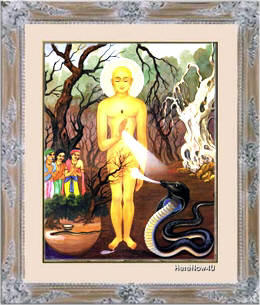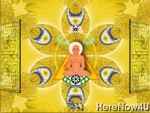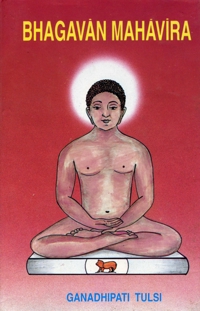| 3 | The Period Of Sadhana |

nce Bhagavan Mahavira was going to northern Vacala through the hermitage of Kanakakhala. When the cowboys saw him, they came to him running and said, "Sir, the path through which you are going is a short-cut, no doubt, but it is fraught with dangers. A little ahead there is a snake called Candakausika. The person on whom it casts a glance would be burnt to ashes." They advised him to take another route and not (o play havoc with life on purpose. It was a correct' advice for those who long for life. But Mahavira bad renounced all craving for keeping himself alive and therefore he also did not entertain any desire to die even. He saw life and death in a different perspective. Ordinarily we believe that one does not want to die also. But the truth is that he who wants to live also wants to die. Once the desire to die disappears, with it disappears the desire to live also. The desire for life is inseparably tied to the desire for death. Mahavira had risen above life and death, which are like the two facets of a coin. He had become totally immersed in his soul, which transcends life and death. He did not heed the warning given to him by the cowboys and proceeded forward. He had adopted an equalitarian attitude towards all living beings. The prospect of encountering the snake was a welcome opportunity. He did not like to lose it. Without the least hesitation, there he walked up to the interior of the forest and began to meditate in a standing position.

The snake appeared on the scene after it had taken a round of the hermitage. It became suddenly enraged when it sensed that somebody stood before it. It could not tolerate the man encroaching upon his domain. It spread its hood, looked at the sun and then at Bhagavan Mahavira. The serpent began to spray its poison, which spread over the aura around Mahavira 's body. The entire atmosphere became poisoned, but Bhagavan Mahavira remained unaffected. He stood motionless in an atmosphere surcharged with poison. An endless stream of spiritual companion flowed from his steady gaze at the snake. There ensued a duel between love and rage, nectar and poison.
Seeing all this, the snake could not believe his eyes. He was convinced that the person at whom he looked would be suddenly burnt to ashes. Now it was a new experience for it. It spitted more poison but finding the man before it unaffected its rage knew no bounds. It again tried to cast a dangerously poisonous glance at Bhagavan Mahavira but could not succeed. It tried a third time and again failed in its attempt. It moved nearer Bhagavan Mahavira, but the latter was perfectly composed. While the serpent sprayed poison at him, he continued to look at it kindly. It was a strange tussle between love and anger. The snake bit the foot of Bhagavan Mahavira and blood began to flow from it. The snake began to suck the blood but to his surprise he found that it was not blood he was sucking, but milk. The snake bit Bhagavan Mahavira 's foot a second and then a third time and every time it felt that only milk flowed from the victim's body. The serpent coiled round the body of Bhagavan Mahavira but he could not upset him. The snake lost its self-confidence and presumptuousness. Its anger disappeared and it became calm. It ate a humble pie. Its grip on Bhagavan Mahavira 's body began to become loose. Love became victorious. When Bhagavan Mahavira 's meditation was over, he saw the motionless snake sitting docilely before him. He addressed the snake thus: " Candakausika, be calm! You are born as a snake because you had been a victim of anger in your previous life. Then you had been ascetic. You had once trampled to death a frog. One of your disciples had entreated you to do a penance for the sin but you refused to do so.
"Enraged by the repeated entreaties of the disciple, you tried to strike him and having lost the sense of proportion you crashed against a pillar and broke your head. In the next life, you became the head of this hermitage where the inmates practised spiritual discipline. As you were prone to great anger, you were named Candakausika. Once the prince of Svetambi came to your hermitage and while he was plucking fruits and flowers you became so much enraged that you ran after him with an axe in your hand. You slipped on the ground and fell into a ditch and were fatally injured by your own axe. After the death, there you are as a reborn deadly poisonous serpent. You have already suffered much due to your passionate nature. Leave the passion of anger like your worn-out skin and be peaceful once for all."
Candakausika began to remember its past life. All the events of that life began to float in its memory. His heart changed and the seeds of equalitarianism for all living beings began to sprout in him.
Bhagavan Mahavira lived for fifteen days in the hermitage and observed complete fast during this period. The serpent also sat in attendance and fasted. On the fifteenth dark night of the lunar month of the Caitra, Candakausika gave up its body. Bhagavan Mahavira went to Uttaravacala to break his fast. He would not accept food especially prepared for him. Whatever food he got already cooked, he accepted it. While in search of such food, he went to the house of one, Nagasena. Nagasena offered him rice pudding. Nagasena was very happy. Incidentally, his son who had been absconding for the last twelve years, returned. Nagasena 's joy knew no bounds. After his meals Bhagavan Mahavira left Vacala and proceeded further.
During the period of his sadhana, Bhagavan Mahavira mostly observed fast. The days of fasting outnumbered those of taking meal. During his fasts, he would stay in the forests and enter a village only when he had to seek food. This routine continued during the period of his sadhana.
Bhagavan Mahavira performed sadhana for twelve years and six and a half months. Most of this period was spent in meditation and he spoke little. For a few years he lived alone and for some time he was accompanied by GosaIaka. He patiently bore the inclemency of the weather as well as hardships caused by men, beasts and gods. His steadfastness was tested time and again, but he never lost it. He had delved so deep in his soul that these outward happenings would not affect him at all.
 Acharya Tulsi
Acharya Tulsi


